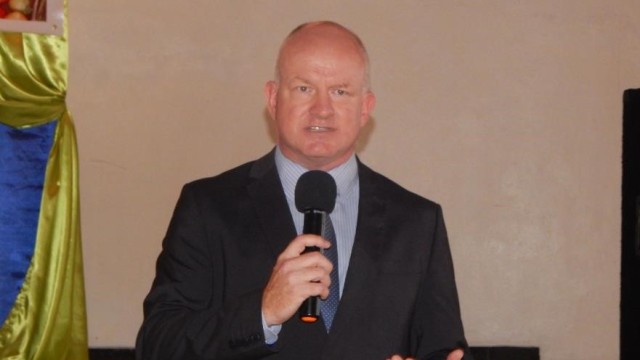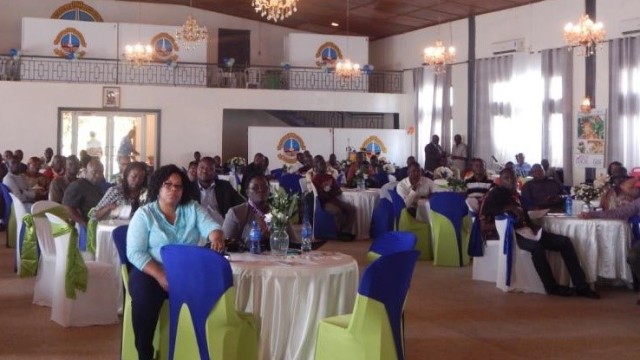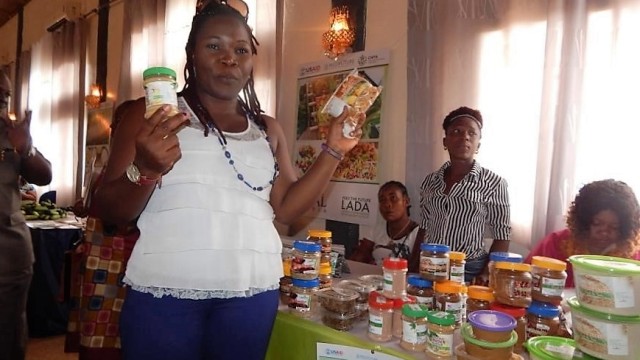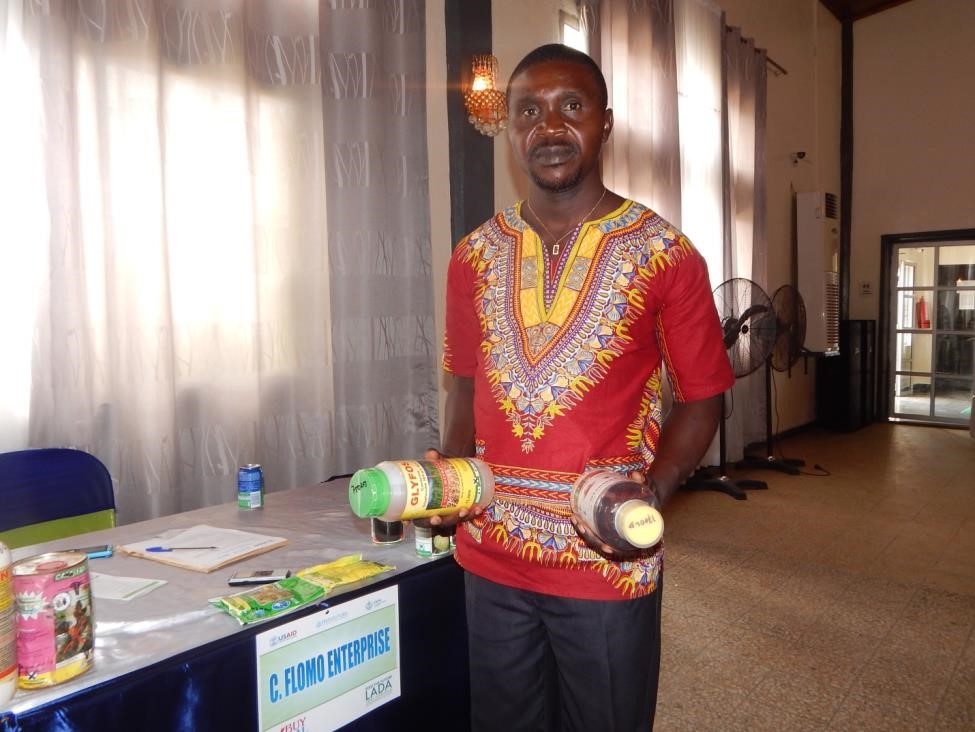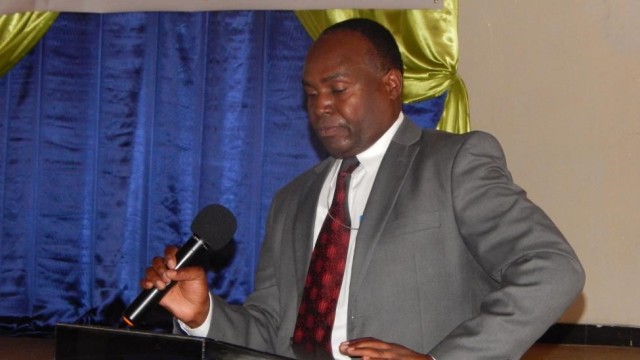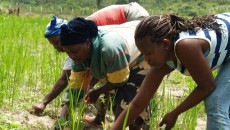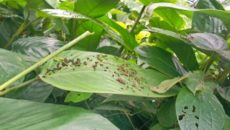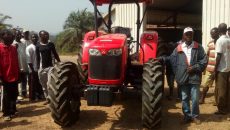PAYNESVILLE, Montserrado – On Wednesday, leading businesses in the agriculture sector and other stakeholders participated in an event focusing on private sector investment, commercial finance, and sustainable linkages within the agriculture sector.
The event was the first of its kind since the USAID-funded Food Enterprise Development project ended. The new USAID initiative targeted at the agriculture sector is called LADA, short for Feed the Future Liberia Agribusiness Development Activity.
LADA, which is being implemented by Cultivating New Frontiers in Agriculture, aims to increase the agricultural income of smallholder farmers through investment in the agribusiness sector in four counties over the period of five years.
With a fund of nearly US$20 million, the project is expected to achieve its goal by expanding farmers’ access to the market by boosting post-harvest handling, processing, packaging, and marketing services. The overall aim is to increase the on-farm productivity and income of Liberian farmers.
Daniel Gies, the Chief for Party for LADA, said his organization would employ a different approach to improve food production in the country than the method used under the Food Enterprise Development project.
“Liberians eat a lot of rice and even produce better rice,†he said. “What they don’t do is to produce and market enough. What we hope to do is to increase the level of homegrown domestic rice, cassava, and vegetables, so that Liberia doesn’t have to import a lot.â€
Gies said LADA would provide funding and connections to financial institutions to local processing and marketing companies who would be involved in buying from farmers. He said farmers face a hurdle in selling their produce because of the lack of storage or capacity to transport their goods.
“We are working with processors on the marketing side to get more rice, vegetables, and cassava purchased from farmers,†he added. “What we’re doing is we’re building a network of the private sector and agro-dealers who are going to sell these stuff, bring in good qualities.â€
Gies also disclosed that the project would provide farmers with agricultural inputs including fertilizers, seeds, and pesticides.
Additionally, he said LADA is working with the Ministry of Agriculture to strengthen the ministry’s capacity to influence better laws. Such laws could allow farmers to have better access to services they need, such as mechanisms through which they can obtain financing to increase their production.
LADA will focus almost exclusively on key crops and Gies said his organization “chose rice, vegetable, and cassava because in the counties we are operating in – Nimba, Montserrado, Bong and Lofa – these are the value chain commodities that offer the most opportunity to the larger number of smallholder farmers.â€
However, he said the project has also requested approval from USAID to include cash crops such as cocoa.
More than twelve local agribusinesses including Organic Matters, Women and Children Development Association of Liberia, Bravo Enterprise, Gbehlay Geh Women, Ma Bundor Farm, and Patom Enterprise participated in the event. The businesses displayed their goods to attendees, which mostly included vegetables, rice, and cassava products.
Patricia Gant, the CEO of Patom Enterprise, said she has been involved with the food preservation and packaging business for at least seven years.
She said her products of mainly preserved vegetables, sauces, and powders are being sold in local supermarkets and also exported to African food stores in the United States.
Gant said the major challenge for the business is packaging: “We have to go to Ghana because Liberia does not have a packaging company.â€
While Liberia does indeed have some companies that produce packaging for businesses, their selections are limited, and small business owners often complain that the few local packaging companies require minimum orders that are infeasible for small businesses.
The head of C. Flomo Enterprise, which markets chemicals and seeds, said his business has built a network of local farmers in Nimba.
Craig said while his products are not locally made, he sells them to farmers to help protect their crops from pests, thereby enhancing productivity.
He said he saw the one-day event as crucial in helping him network with other farmers and agribusiness dealers.
To achieve some of its goals, LADA has set up a co-investment fund of US$3 million for agricultural processors, according to Watchen Harris Bruce, LADA’s agribusiness private sector advisor.
Bruce said that money would facilitate investments by emerging and active agro-dealers in small-to-medium scale storages, cold storages, and transportation and processing enterprises to develop the needed infrastructure in post-harvest handling and marketing.
However, she said those investments would be based on market demands. Additionally, a Liberian national or a legal entity in the country would have to provide a 50 percent matching contribution for the business establishment or expansion.
The project is also working with the Business Startup Center to advocate for agribusinesses in the country and improve their capacity in business skills.
William Dennis II, the BSC Monrovia director, said his network would provide information services, networking, and training for beneficiary organizations. He said access to funding and the lack of farm-to-market roads are key areas that pose challenges to the sector.
While road connectivity remains a major issue in some of the targeted counties, LADA’s chief of party said USAID has announced that it has allotted additional US$1 million to fix truck roads.
Deroe Weeks, executive director of food security and nutrition at the Ministry of Agriculture, welcomed the partnership and collaboration between the ministry and LADA.
Weeks said the ministry is now particularly keen about increased private sector investment in agricultural inputs and post-harvest handling and auxiliary services.
She said the country is now carrying out an electronic registration of farmers to enable provision of a variety of services.
“The Liberia Agricultural Transformation Agenda, or LATA, highlights engagement of public-private partnership, private sector investment, and value chain development in key major commodities such as rice, cassava, oil palm, cocoa, fisheries, and aquaculture among others,†she said.
Also speaking at the event was Maurice Ogotu, USAID’s Economic Growth Office representative. Ogotu said LADA welcomed the partnership with LATA. He added that the MOA-run projects was well-positioned to support the country’s agricultural transformation.
“The partnership will help agriculture-related input-dealers, processors, transporters, storage facility managers and other actors in the selected value chains to produce high quality, value added products that meet consumer demands as well as fetch competitive market prices for everyone along the value chain,†he said.
Featured photo by Gbatemah Senah

